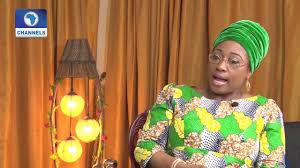Opinions
Erelu Fayemi at 60: It’s the humanitarian factor for me By Olayinka Oyebode
I have many good reasons to join millions other well-wishers home and abroad to celebrate Erelu Bisi Fayemi on her day.

By Olayinka Oyebode
Purple is the colour today, no doubt, sixty is the milestone and joyful is the mood as friends, family members, associates and mentees as well as an army of beneficiaries of her generosity rise in unison to celebrate one of God’s gifts to humanity- Erelu Bisi Fayemi, the immediate past First Lady of Ekiti State and Co-founder of the African Women’s Development Fund (AWDF), regarded as one the most impactful non for profit organisations, supporting women in the continent.
I have many good reasons to join millions other well-wishers home and abroad to celebrate Erelu Bisi Fayemi on her day. On a personal level, I am a testifier to her magnanimity, generosity of spirit and keen interest in uplifting other individuals and working hard to rally support, empower and raise the bar for women and the girl child.
‘Erelu Bam Bam’ or “Ochiorah” as she is fondly called by her numerous admirers, is many things to many people. But the main attribute of hers that stands out of the pack is her generosity of spirit. Apparently, she has milk of human kindness flowing through her veins. And for this, some call her ‘Mother General’. She also goes by the name ‘Yeye Atayese’. ‘Yeye Oba’. All these sobriquets speak to her royalty, the grace she wears like a garmenr, loyalty to good causes and penchant for supporting and lifting others.
To these attributes of brilliance, kindness, thoroughness, thoughtfulness, decency and civility should be added a number of others, too numerous to be outlined in a short tribute such as this. There are for instance, such attributes as her frankness, firmness, wittiness, creativity, eye for details, her insatiable penchant for excellence, ability to bring out the best in people, and her love for art works. Erelu Fayemi’s unmatched ability to mix freely with the lowly placed, the struggling and the mighty is a classical lesson in inter- personal relationship management. And quite remarkable is her simple way of turning up bold, brave, brainy and beautiful, decked in her favourite well styled ankara or lace materials, designer bags and top range jewellery. A prolific writer, historian, gender development advocate of repute, Erelu is at home with words. Words – creative words are the vital flavour that spice up her weekly newspaper column- ‘Loud Whispers’ and her Above Whispers.com blog. Her words, like Mother Teresa wrote, “leaves an endless echoes”. Her spoken words are inspiring, reassuring and possess therapeutic effect.
In giving back to the society, Erelu has mastered the art of doing it effortlessly with focus on change and transformation that would be the portion of the benefitting individuals, groups or communities. This is because her motivation is anchored on the biblical injunction: “Love your neighbour as yourself”. She is not just a woman of substance with a heart of gold, she is a humanitarian who has dedicated her life to the service of humanity. No one comes in contact with Erelu without a good story to tell. Even her most rabid critic readily admits this as well as her ability to use power and influence quite positively.
My first encounter with Erelu Bisi Fayemi was on January 3, 2011 when I resumed in her office as her Special Assistant on Media, following my appointment by her husband, Dr Kayode Fayemi, then the Governor of Ekiti State. I had resumed with much enthusiasm at the Governor’s office that fateful morning only to be told that I had been re-assigned to the office of the Wife of Governor as her SA Media. The development dampened my spirit, having not had a prior working experience under a female boss. I quickly put calls across to a few friends and relations on the fate that had befallen me. Some pitied me, while some urged me to give it my best. I walked the 300 metres distance between the Governor’s office and the office of the Wife of Governor, with dejection. All that melted immediate I entered Her Excellency’s office.
The one hour meeting with Erelu was all I needed to convince myself that I was in the right place at the right time with the right principal. The meeting turned out an interview cum motivational session. I left her office feeling some inches taller than I came in, armed with some tips on better work ethics, interpersonal skills, and a better estimation of myself as a media and public relations professional.
“Your CV is quite impressive, and I have read some of your published works. I have no doubt you will go far if you remain steadfast”, she told me as she opened her diary and took me through her itinerary and work plan for the next three months. “Ise ti bere niyen (the work has started), she said with a smile as she handed me two books- my first gift from her. “You will find these books quite interesting”. What struck me most during our conversation was the fact she asked questions and showed genuine interest in my immediate and future plans, my family and my parents.
Even though my stay in her office was just for six months, as I was promoted and redeployed back to the Governor’s office as the Chief Press Secretary; we however, forged a mother and son relationship that has seen her mentoring and nurturing me till date. Erelu remains one person I can call at anytime to seek her opinion or professional advice on any issue and would readily oblige me. And that goes for many people as she is ever willing and ready to go the extra mile just to make sure everybody around her feel good. She is ever positive and receptive to ideas and even advice from younger people and subordinates, and gives credit to whom it is due, and does not fail to acknowledge, even seemingly inconsequential, gestures.
Erelu’s love for fellow human beings, regardless of their social strata, is legendary. I remember the case of her personal photographer who just went on ‘AWOL’ a few days to a major event. The development caused some anxieties and we had to quickly arrange for a replacement. But when the guy resurfaced in the office some few months later and tendered an apology, Erelu welcomed him after listening to his “story”. Having given directive that the photographer should not be fired, she called me aside and explained to me how ‘crazy’ some highly talented people can be. Citing some of the great works the photographer had churned out, she said it was rather unfortunate he did not have the right grooming, just like many other talented fellows. She then threw a challenge at me that I should endeavour to provide the needed guidance to the photographer so he could make the best of his enormous talent. At another instance, I witnessed Erelu insisting that a committee I served on should pay what she considered a “just and fair” professional fee to a chap we hired to do a job. She was of the opinion that it would be unfair to pay a poor wage and expect excellent service delivery. Based on her insistence the chap got an upward review that positively impacted his life.
There are legion other instances of Erelu championing and defending the rights of women and the girl child. She does this with her personal resources and institutionalises it through partnership with relevant organisations and development agencies. As First Lady in Ekiti State, she facilitated the multiple births Fund, which provides support for families that give birth to multiple births ( i.e twins, triplets etc). A few years back, she set up ‘The Wrapper Network’ an online mentoring and support program for over 4,000 young women.
Born in Liverpool, England on June 11, 1963, Erelu Bisi Fayemi has a BA (1984) and MA (1988) in History from the University of Ife, Nigeria (now Obafemi Awolowo University). She also received an MA in Gender and Society (1992) from Middlesex University, UK. She served as a United Nations Women Nigeria Senior Advisor (2017-2018) and is currently a Visiting Senior Research Fellow at the Africa Leadership Centre, King’s College, London. In 2000, she co-founded the African Women’s Development Fund, (AWDF) – the first Africa-wide grant-making foundation, which supports the work of organizations promoting women’s rights in Africa. Since it began grant-making in 2001, AWDF, based in Accra, Ghana, has supported over 3,000 women’s organisations in 42 African countries and the Middle East with millions of dollars in grants.
Today, I join million others in singing a birthday song to this quintessential leader, celebrated teacher, writer, women rights advocate and global citizen, Erelu Bisi Fayemi. Sixty hearty cheers “Mother-General”!
- Oyebode, is Special Adviser (Media) to Ekiti State Governor.



